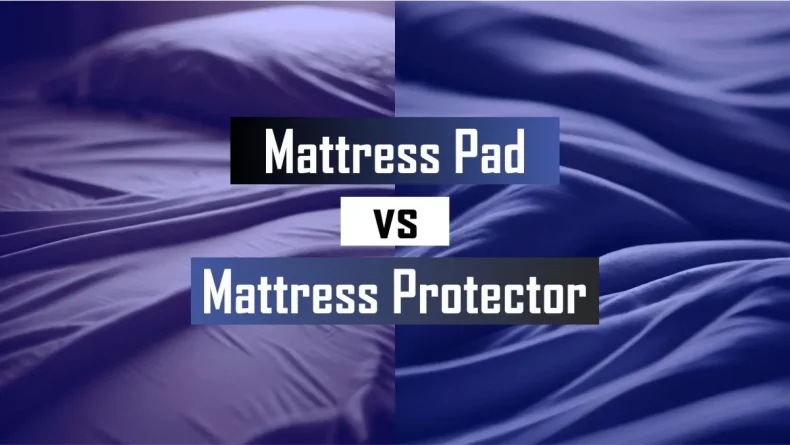
Regarding ensuring a comfortable and hygienic sleep environment, two essential bedding accessories often come into the spotlight: the mattress pad vs mattress protector.
While both serve the purpose of protecting your mattress, they have distinct features and functions that make them unique.
In this article, we’ll explore the differences between a mattress pad and a mattress protector, helping you decide which suits your needs best.
What is a Mattress Pad?
A mattress pad is a thick cushioning layer on top of your mattress, providing additional comfort and support. It typically features a quilted design with polyester, cotton, or memory foam fillings.
Mattress pads often come with elasticized corners or straps to secure them to the mattress, preventing them from shifting during sleep.
| Types | Features |
|---|---|
| Memory Foam Mattress Pad | Provide Support and Pressure ReliefReduce Motion Transfer |
| Down Mattress Pad | Fluffy Feathers from Ducks or GeeseBreathability and Natural Insulation |
| Wool Mattress Pad | Excellent Temperature RegulationHypoallergenic |
| Cotton Mattress Pad | LightweightBreathableEasy to Clean |
| Latex Mattress Pad | Synthetic or Natural Latex Foam |
| Waterproof Mattress Pad | Polyurethane Layer |
| Heated Mattress Pad | Built-in Heating Elements |
What is a Mattress Protector?
A mattress protector is a thin, waterproof cover that encases your mattress, safeguarding it against spills, stains, dust mites, and allergens.
Unlike a mattress pad primarily focuses on comfort, a mattress protector prioritizes protection. It is usually made of vinyl, polyurethane, or breathable fabrics with waterproof coatings.
Now that we have a brief overview of these two bedding accessories, let’s delve deeper into their features and benefits.
| Types | Features |
| Waterproof Mattress Protector | Polyurethane or Vinyl |
| Allergen-Proof Mattress Protector | Barrier against Allergens |
| Dust Mite-Resistant Mattress Protector | Inhibit the Growth and Proliferation of Dust Mites |
| Quilted Mattress Protector | Extra Layer of Padding and Comfort |
| Cooling Mattress Protector | Advanced Cooling Technologies |
| Noiseless Mattress Protector | Prevent the Rustling or Crinkling Sounds |
Also read: How to Wash Mattress Protector in 8 Simple Steps [2023]
Conclusion
Choosing between a mattress pad and a mattress protector ultimately depends on your needs and preferences. A mattress pad is an excellent choice for comfort and additional support.
On the other hand, if protection against spills, stains, and allergens is your main concern, a mattress protector is the way to go. Some individuals may even use both together for the perfect blend of comfort and protection.
Remember, regardless of your choice, regularly cleaning and maintaining your bedding accessories is crucial for optimal hygiene and longevity.
Investing in a high-quality mattress pad or mattress protector can ensure a more comfortable, cleaner, and healthier sleep environment for years.
FAQs
Can I use a mattress pad and a mattress protector together?
A mattress pad and a mattress protector in combination is a popular choices. The mattress protector protects against spills and stains, while the mattress pad provides extra comfort and support.
Are mattress pads and mattress protectors machine washable?
Yes, most mattress pads and mattress protectors are machine washable. However, always refer to the care instructions provided by the manufacturer to ensure proper cleaning and maintenance.
Are mattress pads and mattress protectors suitable for all mattress types?
Yes, mattress pads and protectors are compatible with most mattress types, including foam, innerspring, and hybrid mattresses.
How often should I replace my mattress pad or mattress protector?
Replacing your mattress pad or mattress protector every 2-3 years or as needed is recommended. Regularly inspect them for signs of wear, tear, or decreased effectiveness.
